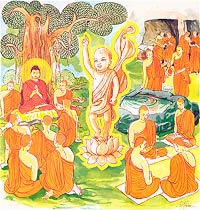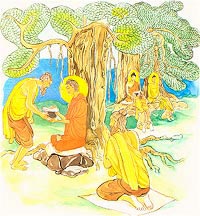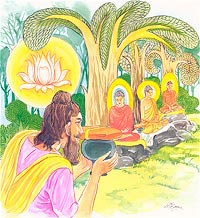09 and 10 06 2012 Saturday and Sunday LESSON 631 FREE ONLINE eNālāndā Research And Practice UNIVERSITY And THE BUDDHISTONLINE GOOD NEWS LETTER by ABHIDHAMMA RAKKHITA through http://sarvajan.ambedkar.org
Dhammapada: Verses and Stories Dhammapada-Sambahulabhikkhu Vatthu - Kassapadasabalassa Suvannacetiya Vatthu -
Four Factors of Happiness -
Worship Those Who Deserve Adoration -
Worship Brings Limitless Merit
 |
Verse 194. Four Factors of Happiness
Explanation: The arising of the Buddha is joyful. The proclamation |
 |
Verse 195. Worship Those Who Deserve Adoration
Explanation: Those who have gone beyond apperception ( the
Verse 196. Worship Brings Limitless Merit
Explanation: One who worships those who have attained imperturbability |
Dhammapada Verse 194
Sambahulabhikkhu VatthuSukho buddhanamuppado
sukha saddhammadesana
sukha sanghassa samaggi
samagganam tapo sukho.Verse 194: Happy is the arising of a Buddha; happy is the exposition of the
Ariya Dhamma; happy is the harmony amongst the Samgha; happy is the practice of
those in harmony.
The Story of Many Bhikkhus
While residing at the Jetavana monastery, the Buddha uttered Verse (194) of
this book, with reference to many bhikkhus.Once, five hundred bhikkhus were discussing the question “What
constitutes happiness?” These bhikkhus realized that happiness meant
different things to different people. Thus, they said, “To some people to
have the riches and glory like that of a king’s is happiness, to some people
sensual pleasure is happiness, but to others to have good rice cooked with meat
is happiness.” While they were talking, the Buddha came in. After learning
the subject of their talk, the Buddha said, “Bhikkhus, all the pleasures
you have mentioned do not get you out of the round of rebirths. In this world,
these constitute happiness: the arising of a Buddha, the opportunity to hear the
Teaching of the Sublime Truth, and the harmony amongst the bhikkhus,”Then the Buddha spoke in verse as follows:
Verse 194: Happy is the arising of a Buddha; happy is the exposition
of the Ariya Dhamma; happy is the harmony amongst the Samgha; happy is
the practice of those in harmony.
At the end of the discourse the five hundred bhikkhus attained arahatship.
Dhammapada Verses 195 and 196
Kassapadasabalassa Suvannacetiya VatthuPujarahe pujayato
buddhe yadi va savake
papancasamatikkante1
tinnasokapariddave.Te tadise pujayato
nibbute akutobhaye
na sakka punnam sahkhatum
imettamapi kenaci.Verse 195: He pays homage to those who are worthy of veneration, whether they
are the Buddhas or their disciples who have overcome obstacles (to Insight
Development) and have rid themselves of sorrow and lamentation.Verse 196: The merit gained by such a person who pays homage to those who
have been freed from moral defilements and have nothing to fear, cannot be
measured by anyone, as this much or that much.
1. papancasamatikkante: lit., who have got rid of craving, pride and wrong
view, factors lengthening samsara.
The Story of the Golden Stupa of Kassapa Buddha
While travelling from Savatthi to Baranasi, the Buddha uttered Verses (195)
and (196) of this book, with reference to a brahmin and the golden stupa of
Kassapa Buddha.On one occasion, while the Buddha and his followers were on a journey to
Baranasi they came to a field where there was a spirit-shrine. Not far from the
shrine, a brahmin was ploughing the field; seeing the brahmin the Buddha sent
for him. When he arrived, the brahmin made obeisance to the shrine but not to
the Buddha. To him the Buddha said, “Brahmin, by paying respect to the
shrine you are doing a meritorious deed.” That made the brahmin happy.
After thus putting him in a favourable frame of mind, the Buddha, by his
supernormal power, brought forth the golden stupa of Kassapa Buddha and let it
remain visible in the sky. The Buddha then explained to the brahmin and the
other bhikkhus that there were four classes of persons worthy of a stupa. They
are: the Buddhas (Tathagatas) who are homage-worthy and perfectly
self-enlightened, the Paccekabuddhas, the Ariya disciples, and the Universal
Monarchs. He also told them about the three types of stupas erected in honour of
these four classes of persons. The stupas where corporeal relics are enshrined
are known as Sariradhatu cetiya; the stupas and figures made in the
likeness of the above four personages are known as Uddissa cetiya; and
the stupas where personal effects like robes, bowls, etc. of those revered
personages are enshrined are known as Paribhoga cetiya. The Bodhi tree is
also included in the Paribhoga cetiya. The Buddha then stressed the importance
of paying homage to those who are worthy of veneration.Then the Buddha spoke in verse as follows:
Verse 195: He pays homage to those who are worthy
of veneration, whether they are the Buddhas or their disciples who
have overcome obstacles (to Insight Development) and have rid
themselves of sorrow and lamentation.Verse 196: The merit gained by such a person who
pays homage to those who have been freed from moral defilements and
have nothing to fear, cannot be measured by anyone, as this much or
that much.
At the end of the discourse the brahmin attained Sotapatti Fruition. The
stupa of Kassapa Buddha remained visible for seven more days, and people kept on
coming to the stupa to pay homage and obeisance. At the end of seven days, as
willed by the Buddha, the stupa disappeared, and in the place of the shrine
erected to the spirits, there appeared miraculously, a big stone stupa.End of Chapter Fourteen: The Buddha (Buddhavagga)
OI
